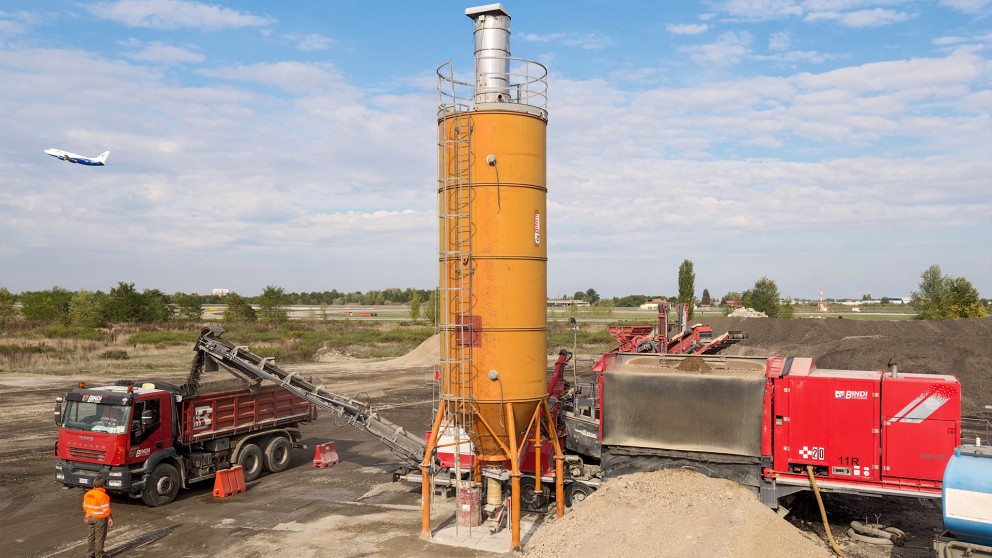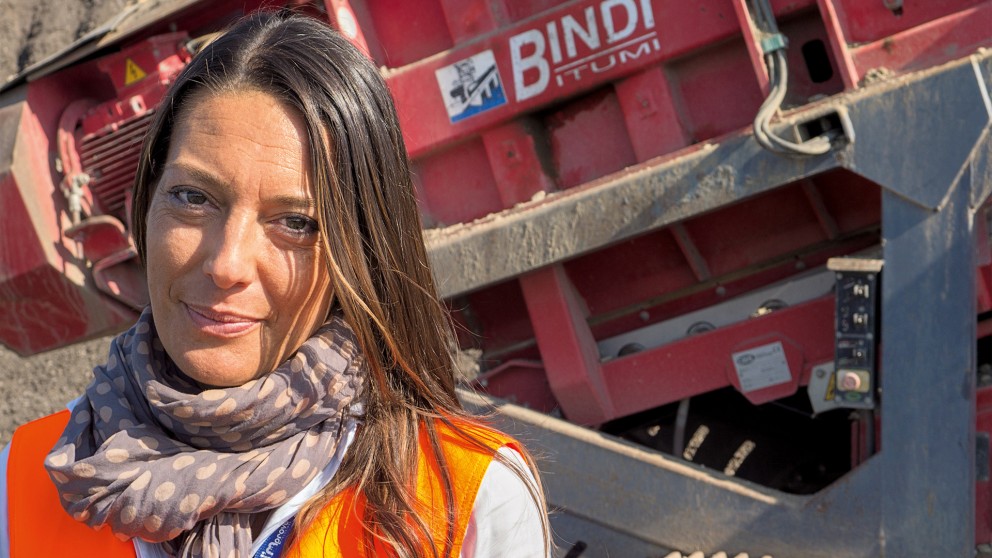Bologna Airport: Wirtgen Group technologies play a key role
Using cold recycling technology, seven machines from Wirtgen, Vögele and Hamm rehabilitate the damaged taxiway at Guglielmo Marconi Airport in Bologna/Italy in a minimum of time and with maximum precision.

Located some 200 km southeast of Milan, Guglielmo Marconi Airport is undergoing extensive rehabilitation work. The paving courses were milled off by the Wirtgen W 200. Easy to handle, the lightweight large milling machine is among the all-rounders in road rehabilitation and boasts an impressive performance and cost-efficiency.
Opened in 1931, the airport handled over 6.5 million passengers in 2014 and today ranks among the seven busiest airports in Italy. The current rehabilitation work is part of an extensive maintenance program that is designed to further improve the complete infrastructure. The focus was initially on the taxiway section between junctions TN (Tango November) and TM (Tango Mike) – including rehabilitation of the drainage system and stabilizing and widening of the shoulders: the inner one (on the apron side) from its current 3.50 m to 9 m, and the outer one (on the runway side) to 7.5 m. The airport authority also called for the stabilization and asphalt resurfacing of a further 70 m of taxiway in the direction of junction TP (Tango Papa).
Following this, the service lane to the south of Apron 2 was also to be rehabilitated and – in a second phase – four aircraft parking bays were to be resurfaced.

One of the invaluable features of the Wirtgen W 200 is Wirtgen's proprietary PTS ("Parallel To Surface") system, which automatically aligns the machine parallel to the road surface in a dynamic process: The front and rear crawler units are lowered evenly and parallel to one another. In addition, the 4-fold full-floating axle, which forms part of the PTS system, quickly balances out any unevenness on the left or right side.
When selecting the machinery, the company commissioned with the construction work, Bindi S.p.A., once again put its trust in the mature technologies of the Wirtgen Group. As usual, the project kicked off with a Wirtgen cold milling machine – in this case the W 200. Among other things, it is perfectly suited to the large-area, selective milling of surface courses at high daily performance rates. On the badly worn taxiway with a length of 340 m and a width of 23 m, the large milling machine also proved equal to the task of milling out the entire surfacing to a total depth of 70 cm in three passes. Unmistakable signs of a reduced load-bearing capacity of the underlying base courses had prompted the responsible managers to take this decision.
To remove the pavement highly effectively yet economically, the machine operator brought one of the numerous, invaluable features of the W 200 into play: the three, selectable milling drum speeds. They can be conveniently set from the operator's platform and ensure the ideal milling output for the prevailing requirements. In this case, the lowest milling drum speed was called for. Working at this speed, the W 200 with its 558 HP achieves the maximum milling output with reduced fuel consumption per cubic meter of milled material. This setting also minimizes cutter wear.

The Wirtgen mobile cold recycling mixing plant KMA 220 is easy to transport and can be quickly set up in the direct vicinity of the job site. That saves time and truck capacity, as well as being very environmentally friendly. It has its own diesel engine to guarantee independence of the public grid.
But before the taxiway could slip into its new asphalt garb, it was first essential to stabilize the base course, whose load-bearing capacity was no longer sufficient. That was just the job for Wirtgen recyclers and soil stabilizers, which increase the strength of the soil by adding binders, or re-use the milled material to rehabilitate roads in a resource-conserving, eco-friendly process. Indeed, they can even do both of these jobs at once – as the Wirtgen cold recycler and soil stabilizer WR 2400 did in this instance.
Since roughly half of the base course consisted of clayey soil, the other 50% being a mixture of sand and gravel, the recycler and soil stabilizer first mixed it with lime and then, in a second step, with cement. Once the soil had been stabilized in this way, durably restoring its load-bearing capacity, 50 cm of recycled material with a cement content of 6% were then laid. To produce the new base course, Bindi chose a combination of in-situ and in-plant processes, this being the most efficient method under the prevailing local conditions. Once 25 cm of the material originally milled out had been replaced in the milled cut by an excavator, it was time for the Wirtgen recycler and soil stabilizer to get back to work. This time, the powerful milling and mixing rotor of the WR 2400 mixed the material into a homogeneous mass, adding water and cement.
At the same time and just a few meters beyond the airport grounds, the Wirtgen mobile cold recycling mixing plant KMA 220 saw to the mixing of the second pavement layer, which likewise had a thickness of 25 cm. This plant can be used to produce cold mix from a wide variety of new aggregate mixtures, reclaimed recycling materials and binding agents. With its maximum mixing capacity of 220 t/h, the KMA 220 sees to it that a full truckload of 20 t cold recycled mix can be produced and immediately placed again every six minutes. A 20-t Hamm 3520 compactor with 3-point swivel joint and vibratory smooth roller drum was used in Bologna for professional compaction of the final, 50-cm recycled layer.

Ultra-modern, user-friendly technology is the basis for the innovative, environmentally friendly and economical asphalt pavers of the new "Dash 3" generation from Vögele. That also applies to the SUPER 1803-3 wheeled paver used in Bologna.
Finally, the moment had arrived for the SUPER 1803-3 paver from Vögele to fit out the taxiway in its new asphalt attire. Step by step, it paved a 10-cm base course, a 6-cm binder course and a 4-cm surface course. The surface course was paved in stone mastic asphalt to maximize the service life and give aircraft a good grip on the new taxiway, even in bad weather. This material is not only more durable, but also allows optimum drainage of surface water owing to its open grain structure.
Niveltronic Plus®, Vögele's proprietary automatic grade and slope control system installed on the SUPER 1803-3, came into play once again, ensuring that the paving work was true to line and level. In terms of ease of operation, quality and reliability, it is the perfect solution for all grade and slope control tasks. Optimally coordinated with the machine technology, Niveltronic Plus® delivers high-quality paving results based on pre-defined reference values. The Big MultiPlex Ski also employed by Bindi further enhanced the quality of the pavement. Equipped with a row of three sonic sensors, the Big MultiPlex Ski simultaneously scans a reference at several separate points. These measurements can then be used to derive a virtual reference level with the help of the Vögele Niveltronic Plus® system. This is a decisive advantage, particularly on areas like the 23 m-wide taxiway, since lengthy surface irregularities, such as bumps, can easily be detected and evened out in this way.

"The precision of the Vögele SUPER 1803-3 is impressive, even on tightly scheduled jobs, like paving asphalt at airports. It's a great help that the commands are simple, and that you can easily manage and check the numerous parameters involved. That allows me to guarantee the pavement quality," says Enrico Unida, Machine Operator at Bindi.
Finishing was the job of asphalt rollers from Hamm. Here, too, building contractor Bindi was able to rely on the leading technologies of the Wirtgen Group. The DV 90 pivot-steered tandem roller with the time-proven Hammtronic electronic machine management system set the ball rolling, achieving an impressive area output and compaction performance. Immediately after, as a classic part of the workflow, a rubber-wheeled roller added the final touch. Rubber-wheeled rollers like the GRW 18 from Hamm play an important role in final compaction since the kneading effect of the rubber wheels makes for perfect sealing of the surface – as at Guglielmo Marconi Airport, whose taxiway is now optimally equipped for the high dynamic stresses imposed by the aircraft rolling over it.

The Hamm rollers working as a team – and without disrupting normal flight operations. Even with a jumbo jet breathing down their necks, the DV 90 tandem roller and the GRW 18 rubber-wheeled roller continue to compact the fresh asphalt undeterred. The result is a perfect surface that meets the highest quality demands, such as those specifically called for at airports.
Elena Sturlini, Technical Manager at Bindi S.p.A, is certainly pleased with the result, having carried out the rehabilitation work without disrupting normal airport operation. That requirement posed an additional challenge, on top of the already stringent requirements of the project. Sturlini says: "In addition to punctual completion, we primarily had to ensure the quality and durability of the construction work, despite all the logistical challenges involved in the project." Being able to rely on the support of a strong partner was all the more important in this situation. "There's no doubt that, thanks to the reliable operation of the Wirtgen Group technologies, we were optimally equipped to meet the performance parameters stipulated by the airport authority while achieving maximum productivity," says the Technical Manager.

Elena Sturlini, Technical Manager at Bindi, believes that the Wirtgen Group machines and plants made a key contribution to the smooth progression of the rehabilitation work on a job site that posed numerous challenges: "There's no doubt that we were optimally equipped, thanks to the reliable operation of the Wirtgen Group technologies."

Public Relations
Reinhard-Wirtgen-Straße 2
53578 Windhagen
Germany